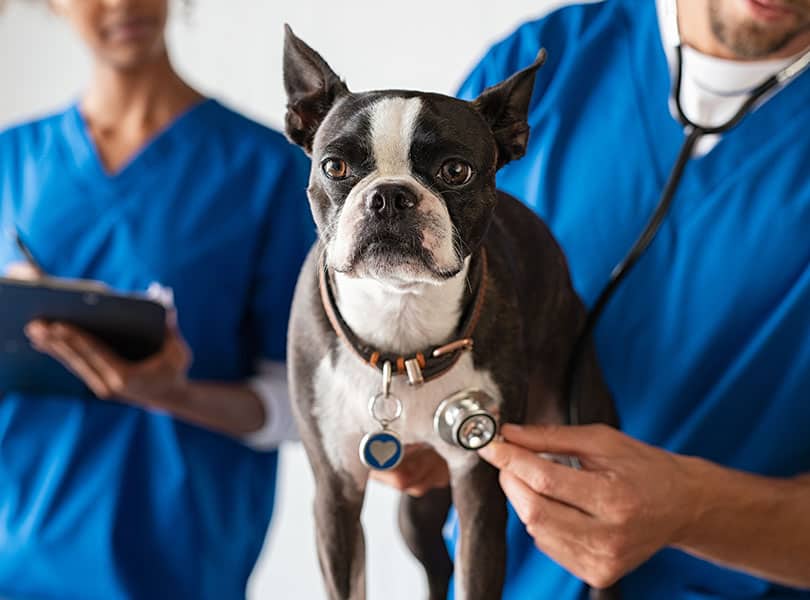5 Signs That Your Pet Might Need a Cancer Veterinary Near Me}
Wiki Article
Checking Out the Necessary Services Offered by a Veterinary Cardiologist: Comprehending Ultrasound and CT Check Strategies
Vet cardiologists play a crucial duty in the wellness of family pets by diagnosing and dealing with different heart conditions. They use advanced imaging techniques, such as cardiac ultrasound and CT scans, to give accurate examinations. Each technique has its distinctive benefits and applications. Comprehending these methods is important for pet owners looking for the most effective look after their buddies. What variables should family pet owners think about when choosing between these diagnostic devices?
The Duty of Vet Cardiologists in Pet Healthcare
Vet cardiologists play a vital function in the healthcare of pets, focusing particularly on identifying and treating heart-related conditions. They possess specialized training that permits them to analyze intricate analysis examinations and recognize different cardio issues. These experts use sophisticated methods, such as echocardiography and electrocardiography, to analyze heart feature and framework accurately.Veterinary cardiologists also establish tailored therapy plans that may consist of drugs, way of life alterations, and, in some instances, medical interventions. Their knowledge reaches educating family pet proprietors regarding heart wellness, highlighting the significance of regular check-ups and very early detection of possible issues. Cooperation with basic veterinarians is crucial, as it guarantees complete look after family pets with believed cardiac problems. By offering specialized solutions, vet cardiologists greatly improve the top quality of life for pets and provide peace of mind for their proprietors, enhancing the relevance of heart health and wellness in general pet dog wellness.Typical Heart Problems in Family Pets
Common heart issues in pets can substantially influence their wellness and lifestyle. Heart whisperings, numerous types of cardiomyopathy, and genetic heart flaws are amongst the most widespread conditions that vets encounter. CT Scans For Dogs. Understanding these issues is vital for pet dog owners to ensure prompt diagnosis and ideal treatmentHeart Murmurs in Pets
Although heart murmurs can be a source of worry for family pet owners, they are not constantly indicative of significant wellness issues. A heart murmur is an unusual noise produced by rough blood flow within the heart. In pets, these whisperings can be brought on by various factors, including hereditary heart problems, valve problems, or even stress and anxiety throughout exams. Many pet dogs with heart whisperings lead typical lives without significant wellness impacts. To determine the underlying reason, veterinary cardiologists usually employ analysis techniques such as echocardiograms and Doppler ultrasounds. Early detection and evaluation are necessary, as they might aid handle any possible cardiac problems efficiently. Family pet owners are motivated to consult their veterinarian for a detailed examination if a heart murmur is identified.Cardiomyopathy Kind Explained
Cardiomyopathy includes a team of diseases influencing the heart muscular tissue, resulting in compromised cardiac function in pet dogs. The most common types include dilated cardiomyopathy (DCM), hypertrophic cardiomyopathy (HCM), and restrictive cardiomyopathy (RCM) DCM primarily influences pet dogs, creating the heart to compromise and increase the size of, which lessens its ability to pump blood efficiently. In contrast, HCM is extra common in cats, characterized by the thickening of the heart walls, commonly leading to obstructed blood flow. RCM, though less typical, happens when the heart muscle mass comes to be inflexible, restricting its capability to loaded with blood. Each kind presents unique challenges in diagnosis and therapy, demanding specialized vet cardiological analysis to assure peak monitoring and look after affected animals.Hereditary Heart Issues
Hereditary heart issues represent a considerable category of heart concerns in pets, distinct from obtained conditions such as cardiomyopathy - Board Certified Veterinary Cardiologist. These flaws are structural problems present at birth, affecting the heart's typical feature. Typical kinds include license ductus arteriosus, ventricular septal issues, and pulmonic stenosis. Signs may differ extensively, varying from mild to serious, and can include exercise intolerance, coughing, and trouble breathing. Early medical diagnosis through sophisticated imaging techniques like ultrasound is essential for reliable management. Vet cardiologists play a vital function in recognizing these problems and suggesting proper treatment options, which may consist of medical administration or medical treatment. Acknowledging congenital heart flaws permits for better end results and boosted quality of life for influenced family petsComprehending Heart Ultrasound: How It Functions
A significant number of veterinary practices now make use of heart ultrasound as a necessary analysis tool for examining heart health in animals. This non-invasive method uses high-frequency acoustic waves to create photos of the heart's structure and feature. Throughout the treatment, a veterinary service technician applies a gel to the pet's breast and makes use of a transducer to release ultrasound waves. These waves jump off the heart and surrounding frameworks, creating real-time images on a monitor.Veterinarians can examine numerous aspects of cardiac health, consisting of chamber dimension, wall activity, and valve function. Furthermore, cardiac ultrasound permits for the detection of problems such as fluid build-up and congenital heart defects. This technique is crucial for diagnosing conditions that may not show go to the website up with common radiographs. By giving in-depth information concerning the heart's anatomy and performance, cardiac ultrasound aids in formulating efficient therapy prepare for pets experiencing cardiovascular disease.The Significance of CT Scans in Detecting Heart Issues
Exactly how do CT scans improve the medical diagnosis of heart conditions in vet medicine? CT scans offer comprehensive cross-sectional pictures of the heart and bordering structures, allowing veterinarians to picture complicated physiological connections. This imaging strategy is specifically helpful in recognizing hereditary heart flaws, cardiac lumps, and irregularities in capillary. By using advanced imaging algorithms, CT scans can examine heart chamber sizes and feature, using a detailed sight that might be difficult to attain with standard methods.Additionally, CT angiography can imagine blood flow and determine areas of stenosis or blockage, which is necessary for planning possible treatments. The speed read what he said and accuracy of CT scans additionally assist in fast diagnoses, crucial in emergency situation situations. Ultimately, the unification of CT checks right into vet cardiology considerably enhances the accuracy of medical diagnoses, enabling targeted therapy strategies and enhancing client results for animals dealing with heart disease.Comparing Ultrasound and CT Scan Methods
While both ultrasound and CT scans are invaluable tools in vet cardiology, they use unique benefits and restrictions that affect their usage in diagnosing heart disease. Ultrasound, or echocardiography, provides real-time imaging of the heart's structure and feature, permitting veterinarians to examine heart chambers, valves, and blood circulation. It is especially effective for assessing conditions like coronary infarction and cardiomyopathy. Nevertheless, ultrasound might be limited in imagining particular physiological structures because of person size or obesity.In contrast, CT checks deal in-depth cross-sectional photos of the heart and surrounding cells, making them suitable for determining structural irregularities, growths, or vascular concerns. Although CT scans supply complete insights, they require sedation and may entail radiation exposure. Inevitably, the choice in between ultrasound and CT checks depends upon the particular clinical scenario, the individual's condition, and the info needed for an accurate medical diagnosis.Treatment Alternatives Available With Veterinary Cardiology
Vet cardiology supplies a variety of treatment options tailored to deal with different heart disease in pets. Therapy plans often start with lifestyle adjustments, including diet plan modifications and exercise changes, focused on improving total heart wellness. Medications play an essential role, with cardiologists recommending medications such as diuretics, beta-blockers, and ACE inhibitors to manage symptoms and improve heart function.In extra extreme instances, interventional treatments, such as balloon valvuloplasty or stent positioning, might be necessary to alleviate obstructions or improve blood flow. For sure congenital heart flaws, surgical choices might be discovered to remedy structural concerns. Furthermore, recurring surveillance and follow-up care are vital components of a thorough treatment plan, permitting prompt changes based on the pet dog's action to treatment. Generally, vet cardiology concentrates on providing effective, personalized treatment to maximize the health and wellness and wellness of animal patients with heart disease.Exactly how to Prepare Your Family Pet for a Heart Evaluation
Preparing a pet for a cardiac analysis is necessary to guarantee exact outcomes and a smooth procedure. Owners should first set up the consultation with the veterinary cardiologist and go over any type of certain demands or issues. It is advisable to keep food for at the very least 12 hours before the evaluation, as this helps enhance imaging high quality throughout procedures like ultrasound or CT scans.Additionally, maintaining a calm setting on the day of the consultation can help minimize the family pet's anxiety. It is valuable to bring along any appropriate medical documents, including previous tests and drugs (Cancer Veterinary Near Me). Proprietors ought to additionally ensure that their animal is comfy and leashed during transportation to the clinic. Acquainting themselves with the examination procedure can minimize concerns and aid in asking notified concerns during the assessment. By complying with these steps, proprietors can contribute substantially to the efficiency of the heart assessmentOften Asked Inquiries
Exactly how Long Does a Cardiac Ultrasound or CT Scan Take?
The duration of a cardiac ultrasound usually varies from 30 to 60 minutes, while a CT check may take about 15 to half an hour. Aspects such as the person's condition can influence these time estimates.
Exist Any Dangers Connected With These Analysis Treatments?

Can I Remain With My Family Pet Throughout the Treatment?
The veterinary center's plan typically determines whether animal owners can continue to be throughout procedures. While some facilities encourage proprietor visibility for convenience, others may require splitting up CT Scans For Animals to assure safety and security and excellent conditions for diagnostic imaging.How Much Do These Analysis Tests Commonly Price?
The expenses of diagnostic examinations, such as ultrasound and CT scans, typically differ based on place and center. Generally, costs vary from a few hundred to over a thousand dollars, reflecting the intricacy and innovation entailed.
What Is the Recuperation Process After a Cardiac Evaluation?
The recovery process after a heart analysis includes keeping track of the animal for any kind of immediate responses, making certain comfort, and restricting physical task. Veterinarians usually provide post-evaluation guidelines to direct pet dog owners during this important recovery period. Heart murmurs, numerous kinds of cardiomyopathy, and congenital heart flaws are amongst the most prevalent conditions that veterinarians experience. A heart murmur is an uncommon audio generated by stormy blood flow within the heart. Cardiomyopathy incorporates a team of diseases impacting the heart muscle mass, leading to endangered heart feature in pet dogs. Genetic heart flaws represent a substantial category of cardiac issues in pets, distinct from gotten conditions such as cardiomyopathy. Ultrasound, or echocardiography, gives real-time imaging of the heart's structure and feature, enabling vets to analyze heart chambers, shutoffs, and blood circulation.Report this wiki page